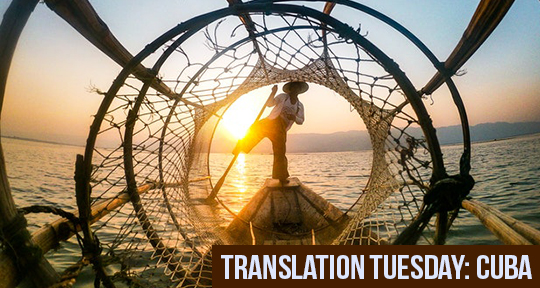Recipient of the prestigious Julián del Casal, Cuba’s National Poetry Prize, Afro-Cuban poet Jesús Cos Causse (1945–2007) was one of the country’s most prolific ambassadors for her arts and literature internationally. This Translation Tuesday, we are thrilled to feature three of Cos Causse’s poems from the collection Los años, los sueños: Poesía, 1970–1994, edited by the Panamanian writer Pedro Correa Vásquez. Cos Causse’s poetic language is direct and evocative, and these poems—keenly attuned to the legacies of slavery in the Caribbean—serve as a site of historical memory and resistance. Kristin Dykstra’s translation brings out the austere music of Cos Causse’s poems that sing collectively of a landscape inflected and transmuted by its violent histories and attendant movements: of setting out, fleeing, and summoning.
Fisherman
The fisherman sets out with his nets, his recollections
and dreams, for his encounter with the sea.
On the high sea, night resembles some unremembered port.
During the voyage he sings on deck,
confuses the moon for a beacon
and thinks of a woman, tattered surf.
The fisherman knows something of sundown’s sorrow:
fire who loves the sea.
At sunrise he returns, so tired that he leaves
his heart on the horizon, only to set out
once again on the same night.
Fugitive
He fled.
His flight had all the beauty of a legend
or a blaze.
Slavehunters searched the mountain
palm by palm
and looked for him in caves,
in mountains, on canefields.
When they thought they could capture him,
spent, he seemed a mystifying shadow
in motion:
wherever they arrived, tracks and shadow
melted away.
They began to believe he was a sorcerer
with occult powers
to transfigure into a bulletwood trunk,
a pool of water, dry leaves,
a sleeping turtle, liana, lizard,
a crab, a serpent, a scorpion.
They found him, it’s true, on the way to the
coast, but hanged
from the highest branch of a flame tree,
the most beautiful on earth.
Bell
The antique bell sits silent
in a corner, accomplice to death.
The bell summoned slaves with its song
of mourning and metal, its bloodied shriek.
Mute and rusted,
enslavement’s bell.
Now the bell is a memento I loathe and I toss it
toward the floor under the Caribbean, in stormy water.
And it fades away, sluggishly, fades away.
So silent, the bell seemed innocent
as though it never summoned my
brothers
to cut those stalks, those immeasurable
fields of cane.
Translated from the Spanish by Kristin Dykstra
Jesús Cos Causse (1945–2007) was born in Santiago de Cuba. Self-taught, he wrote many prizewinning books, among them Con el mismo violín (1970), El último trovador (1975), Las islas y las luciérnagas (1981), and Balada de un tambor y otros poemas (1987). He was active with cultural organizations, serving as vice president at the Santiago office of the Cuban Union of Artists and Writers. Recognizing his own Haitian ancestry, Cos Causse explored African diasporic legacies bridging the islands of the Caribbean, as well as a wide array of other topics such as family life, the social role of the poet/artist, and regional history seen through a post-1959 lens. Cos Causse met many poets through his workshop on the Caribbean and the World, at Santiago’s annual Caribbean Culture Festival. Serie Malunga (University of Pittsburgh) released a new anthology of his work edited by Jerome Branche, Jesús Cos Causse: poesías selectas, in 2021.
Kristin Dykstra is a writer, literary translator, and professor. She is principal translator of The Winter Garden Photograph, by Reina María Rodríguez, Winner of the 2020 PEN Award for Poetry in Translation and Finalist for the National Translation Award. Dykstra organized and introduced a May 2021 dossier dedicated to Rodríguez in Latin American Literature Today. Previously she translated numerous works, among them books by Juan Carlos Flores, Marcelo Morales, Angel Escobar, Tina Escaja, and others. Selections from Dykstra’s current poetry manuscript appear in Lana Turner, Almost Island, Seedings, Clade Song, The Hopper, La Noria and El Nieuwe Acá (both with translations into Spanish by Escaja), and Acrobata (translation into Portuguese by Floriano Martins). Her essay “Ensenada,” co-translated with Juan Manuel Tabío, appeared in Rialta in September 2021.
*****
Read more from Translation Tuesdays on the Asymptote blog:

